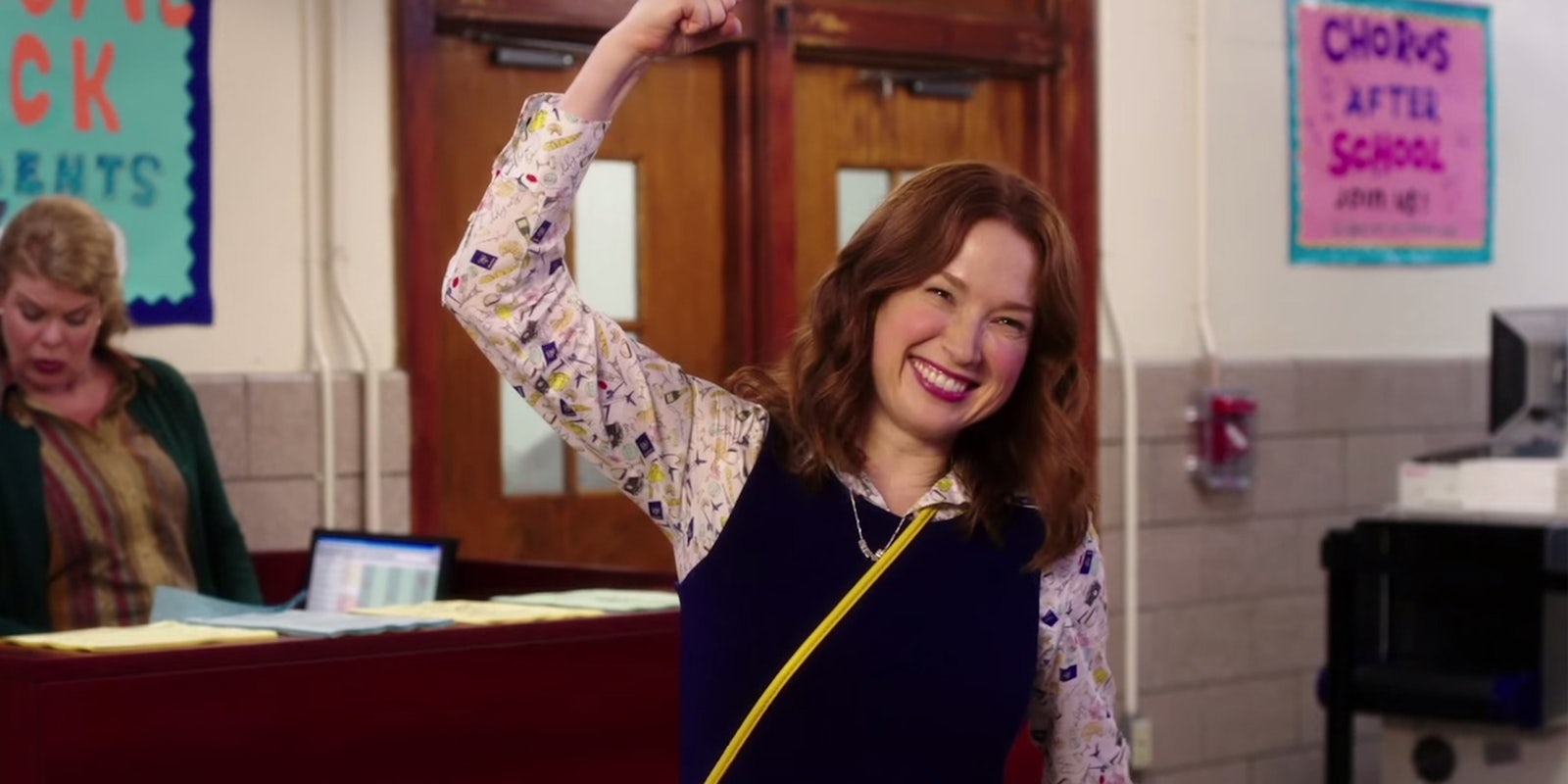There’s a telling scene in the first episode of Unbreakable Kimmy Schmidt, the new Netflix series from 30 Rock’s Tina Fey and Robert Carlock. The titular character, played by The Office’s Ellie Kemper, appears on the Today show with three other women after being rescued from an underground apocalypse bunker. The four—dubbed the “Indiana Mole Women” by the media—have become minor celebrities, and Matt Lauer asks why they went along with the cult leader’s abuse.
One woman says she fell under his sway because she didn’t want to be rude, and Lauer swoops in with the uppercut: “I’m always amazed at what women will do because they’re afraid of being rude.” The line is meant for a laugh, but its truth will lay heavy on most women. The Mole Women then get makeovers to make them look less like victims.
In the show, which debuts on Netflix today, Kimmy mirrors the title: She’s optimistic, eager, excited to learn about the world she’s missed out on for the past 15 years while trapped underground. In her new home of New York City, she doesn’t know that slang has evolved or what a selfie is; she purchases bright pink and yellow clothes and light-up sneakers and eats candy for dinner. She is, in many ways, still a young girl.
“I’d like to think I have a piece of her optimism,” Kemper told the Daily Dot. “I’m not sure that I always do, but I hope in moments I have her sunny outlook on life. I do think Kimmy has a temper; when she sees an injustice taking place or knows something to be wrong, she reacts with a short fuse. And I think I share that. But only when I see social injustice.”
We see why she might have a short fuse: As a middle-schooler, Kimmy was abducted and forced into a cult, led by its manipulative leader to believe that she and the other women are the only survivors of the apocalypse. He also does quite a number on their self-esteem and constantly reminds them they’re dumb and helpless.
In the first six episodes, we never explicitly see what happened to Kimmy, but we get a sense through flashbacks (the cult leader threatens to rape Kimmy after she presents evidence of life to the bunker) and her present-day coping mechanisms (counting to 10 in stressful situations and then starting over). There are also recurring nightmares parodying those creepy Febreze commercials, a pop-culture entry point used to address Kimmy’s PTSD.
https://www.youtube.com/watch?v=mNKEKlXY3Z4
As this was co-created by Fey, there’s naturally a focus on women, our stories, and the masks we sometimes wear to hide trauma or pain. Fey briefly mentioned her own experience with trauma—she was attacked with a knife as a child, which resulted in the scar across her cheek—in a 2009 Vanity Fair interview. She says she “proceeded unaware of it. I was a very confident little kid. It’s really almost like I’m kind of able to forget about it, until I was on-camera, and it became a thing of ‘Oh, I guess we should use this side’ or whatever. Everybody’s got a better side.” It’s not a stretch to see Kimmy as a sort of channel for Fey. Comedy, it has been said, is tragedy plus time.
Kemper says the comedic approach to a survivor story wasn’t meant to belittle women’s experience or minimize their trauma. Rather, it’s a way to elevate women who have lived through something and still carry the weight.
“It shows a smattering of women who are tough,” Kemper said. “And smart. And I know that was the core of what Tina and Robert wanted, that women and men can be strong. And I think the show is focusing specifically on tough ladies.
“After filming, I felt better; it’s inspiring to play someone who won’t be conquered.”
Jane Krakowski plays haughty, appearance-obsessed Jacqueline Voorhees, who hires Kimmy as a nanny for the children she doesn’t know how to talk to. Her character is nearly identical to 30 Rock’s Jenna Maroney in her obliviousness. Tituss Burgess—who you may remember as D’Fwan, the hairdresser in 30 Rock’s Queen of Jordan spoof—stars as Kimmy’s gay roommate, a down-on-his-luck actor who aspires to be on Broadway but has to make ends meet by dressing as an Iron Man knockoff in Times Square. The inimitable Carol Kane is their landlord, Lillian, who goes along with many of their ill-advised schemes and, along with Jacqueline, becomes a friend to Kimmy.
Not everything works. As we explore each character’s past, Voorhees’ inexplicable Native American heritage feels shoehorned in to make a point about identity. The show has a similar flow to 30 Rock, which would have made sense on NBC. But on Netflix, a few of the jokes feel rushed, as if they’re trying to squeeze in before commercial breaks that don’t exist. Some of Kimmy’s inspirational, women-first quotes are a little cringe-worthy and don’t land as gracefully as 30 Rock’s rapid-fire zingers.
Carlock and Fey have mentioned they wanted this to be a modern take on The Mary Tyler Moore Show, but Unbreakable Kimmy Schmidt has a darkness that keeps that show at arm’s length. This makes it a perfect match for Netflix, which has had great success with original dramas but not as much with comedies. Orange Is the New Black comes closest to bridging comedy with darkness and trauma, and both Jenji Kohan and Tina Fey have a talent for scripting realistic characters we find part of ourselves in.
Despite some of the shudder-worthy moments in the series, Kemper gives Kimmy more than just the dimensions of pained victim or irrepressible go-getter. Her second chance makes you root for her. You’ll be amazed at what women will do because they need to survive.
Screengrab via Netflix/YouTube


